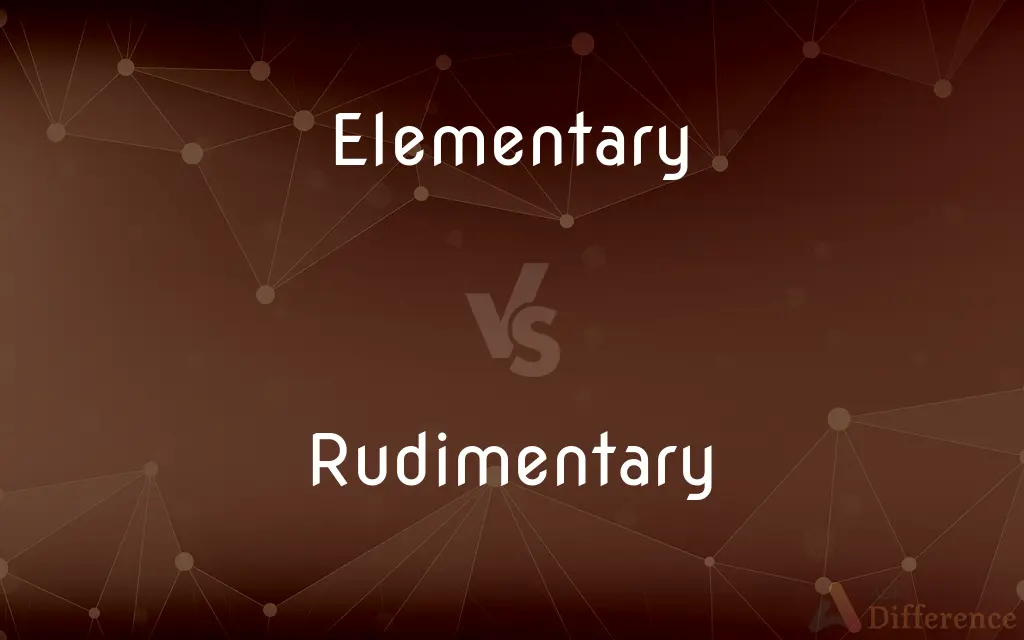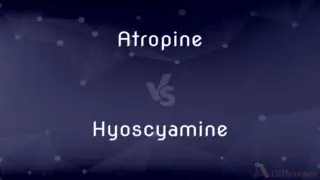Elementary vs. Rudimentary — What's the Difference?
By Tayyaba Rehman & Maham Liaqat — Updated on May 8, 2024
Elementary refers to the basic, introductory aspects of a subject, while rudimentary denotes the most basic or undeveloped stages, often suggesting something incomplete.

Difference Between Elementary and Rudimentary
Table of Contents
ADVERTISEMENT
Key Differences
Elementary concepts provide foundational knowledge in any field, ensuring a basic understanding. Rudimentary, on the other hand, refers to the initial stages or fundamental principles, but often implies that further development is needed.
Elementary education is a structured system providing young learners with the essentials of math, reading, and writing. Rudimentary education describes a very basic or incomplete learning experience, often lacking structure.
Elementary understanding is often sufficient for casual engagement or everyday tasks. Rudimentary understanding might hinder performance due to significant gaps in knowledge.
Elementary proficiency in a language enables basic communication. Rudimentary proficiency means one can understand or express only very simple concepts, often struggling with more complex ideas.
Elementary approaches often include fundamental methods and guidelines to ensure foundational competence. Rudimentary approaches, however, may lack refinement and rely on very simple tools or techniques.
ADVERTISEMENT
Comparison Chart
Definition
Basic and introductory
Incomplete and underdeveloped
Usage Context
Foundational learning
Early, often primitive stages
Education Level
Primary school level
Minimal education, lacking structure
Language Proficiency
Basic but adequate
Limited and underdeveloped
Skills Application
Solid groundwork
Needs refinement and improvement
Compare with Definitions
Elementary
Basic or primary level of education.
She teaches at an elementary school.
Rudimentary
Relating to the basic stages or principles.
The invention was still in its rudimentary form.
Elementary
Simple or fundamental concepts.
The manual provided an elementary explanation of the process.
Rudimentary
Limited in scope or completeness.
He has a rudimentary grasp of programming concepts.
Elementary
Essential or necessary.
Learning how to measure ingredients is elementary in cooking.
Rudimentary
Related to essential principles.
Her designs displayed rudimentary architectural skills.
Elementary
Related to the first stages.
In elementary music lessons, they learned to read simple notes.
Rudimentary
Primitive or underdeveloped.
Their understanding of the rules was rudimentary.
Elementary
Introductory in nature.
His elementary knowledge of art made the exhibit confusing.
Rudimentary
Lacking sophistication or refinement.
The cave paintings depicted rudimentary forms of art.
Elementary
Of, relating to, or constituting the basic, essential, or fundamental part
An elementary need for love and nurturing.
Rudimentary
Of or relating to basic facts or principles; elementary
I have only a rudimentary knowledge of Greek.
Elementary
Of, relating to, or involving the fundamental or simplest aspects of a subject
An elementary problem in statistics.
Rudimentary
Being in an early stage of development or having a simple form
Traveled upriver in a rudimentary boat.
Elementary
Of or relating to an elementary school or elementary education
The elementary grades.
Elementary teachers.
Rudimentary
(Biology) Imperfectly or incompletely developed
A mutant mouse with rudimentary claws.
Elementary
Relating to the basic, essential or fundamental part of something.
Rudimentary
Of or relating to one or more rudiments.
I have only a rudimentary grasp of chemistry.
Elementary
Relating to an elementary school.
Rudimentary
Basic; minimal; with less than, or only the minimum, necessary.
His grasp of rudimentary English allowed him at least to do the shopping.
His rudimentary driving skills meant that he was a danger on the road.
Elementary
(physics) Relating to a subatomic particle.
Rudimentary
One of the rudimentary mammae of boars.
Elementary
(archaic) Sublunary; not celestial; belonging to the sublunary sphere, to which the four classical elements (earth, air, fire and water) were confined; composed of or pertaining to these four elements.
Rudimentary
Of or pertaining to rudiments; consisting in first principles; elementary; initial; as, rudimental essays.
Elementary
An elementary school
Rudimentary
Very imperfectly developed; in an early stage of development; embryonic.
Elementary
A supernatural being which is associated with the elements.
Rudimentary
Being or involving basic facts or principles;
The fundamental laws of the universe
A fundamental incompatibility between them
These rudimentary truths
Underlying principles
Elementary
Having only one principle or constituent part; consisting of a single element; simple; uncompounded; as, an elementary substance.
Rudimentary
Being in the earliest stages of development;
Rudimentary plans
Elementary
Pertaining to, or treating of, the elements, rudiments, or first principles of anything; initial; rudimental; introductory; as, an elementary treatise.
Rudimentary
Not fully developed in mature animals;
Rudimentary wings
Elementary
Pertaining to one of the four elements, air, water, earth, fire.
Elementary
Easy and not involved or complicated;
An elementary problem in statistics
Elementary, my dear Watson
A simple game
Found an uncomplicated solution to the problem
Elementary
Of or being the essential or basic part;
An elementary need for love and nurturing
Common Curiosities
Is "elementary" always positive, and "rudimentary" negative?
Not necessarily, but "elementary" is often neutral or positive, while "rudimentary" frequently implies insufficiency.
Can "rudimentary" describe skills?
Yes, it often indicates an incomplete or basic level of skill, suggesting that further development is needed.
Are "elementary" and "rudimentary" synonyms?
They can sometimes overlap, but "rudimentary" often implies underdevelopment, while "elementary" signifies foundational knowledge.
Does "rudimentary" always imply incompleteness?
Yes, "rudimentary" generally implies something is in its basic, initial, or undeveloped stage, often suggesting the need for further improvement.
How do these terms apply to language learning?
Elementary refers to basic yet sufficient proficiency, whereas rudimentary indicates a very limited ability.
Can "rudimentary" have a positive connotation?
Rarely. "Rudimentary" usually has a slightly negative connotation, implying a lack of sophistication or completeness.
How does "elementary" compare to "basic"?
"Elementary" and "basic" both refer to the essential or foundational level, but "basic" is more general, whereas "elementary" often relates specifically to introductory education.
What does "elementary" mean in education?
It denotes primary or foundational levels of learning, usually referring to the early years of schooling.
Is "elementary" only used in an academic context?
No, "elementary" can also describe foundational principles or basic concepts in various fields, not just academics.
What are some synonyms for "rudimentary"?
Synonyms include primitive, undeveloped, basic, and embryonic.
Can "rudimentary" be used in scientific contexts?
Yes, in science, "rudimentary" can describe structures or features that are underdeveloped or basic, such as in evolutionary biology.
Does "elementary" always mean essential or necessary?
Not always. While it often implies essential learning, it can also simply denote an introductory level without being absolutely necessary.
What are some synonyms for "elementary"?
Synonyms include fundamental, basic, introductory, and foundational.
Is "rudimentary" interchangeable with "preliminary"?
No, "preliminary" implies preparation or planning for something more advanced, whereas "rudimentary" means something underdeveloped or incomplete.
How does "elementary" relate to professional skills?
In professional settings, "elementary" skills are foundational competencies that provide the groundwork for advanced expertise.
Share Your Discovery

Previous Comparison
Atropine vs. Hyoscyamine
Next Comparison
Cricket vs. RoundersAuthor Spotlight
Written by
Tayyaba RehmanTayyaba Rehman is a distinguished writer, currently serving as a primary contributor to askdifference.com. As a researcher in semantics and etymology, Tayyaba's passion for the complexity of languages and their distinctions has found a perfect home on the platform. Tayyaba delves into the intricacies of language, distinguishing between commonly confused words and phrases, thereby providing clarity for readers worldwide.
Co-written by
Maham Liaqat















































